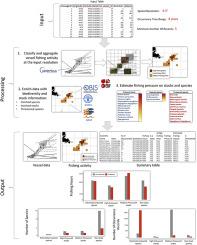Ecological Informatics ( IF 5.1 ) Pub Date : 2021-08-05 , DOI: 10.1016/j.ecoinf.2021.101384 Gianpaolo Coro 1 , Anton Ellenbroek 2 , Pasquale Pagano 1

|
Vessel tracking data help study the potential impact of fisheries on biodiversity and produce risk assessments. Existing workflows process vessel tracks to identify fishing activity and integrate information on species vulnerability. However, there are significant data integration challenges across the data sources needed for an integrated impact assessment due to heterogeneous nomenclatures, data accessibility issues, geographical and computational scalability of the processes, and confidentiality and transparency towards decision making authorities.
This paper presents an Open Science data integration approach to use vessel tracking data in integrated impact assessments. Our approach combines heterogeneous knowledge sources from fisheries, biodiversity, and environmental observations to infer fishing activity and risks to potentially impacted species. An Open Science e-Infrastructure facilitates access to data sources and maximises the reproducibility of the results and the method's reusability across several application domains.
Our method's quality is assessed through three case studies: The first demonstrates cross-dataset consistency by comparing the results obtained from two different vessel data sources. The second performs a temporal pattern analysis of fishing activity and potentially impacted species over time. The third assesses the potential impact of reduced fishing pressure on marine biodiversity and threatened species due to the 2020 COVID-19 lockdown in Italy. The method is meant to be integrated with other systems through its Open Science-oriented features and can rapidly use new sources of findable, accessible, interoperable, and reusable (FAIR) data. Other systems can use it to (i) classify vessel activity in data-limited scenarios, (ii) identify bycatch species (when catchability data are available), and (iii) study the effects of fisheries on habitats and populations’ growth.
中文翻译:

从船舶跟踪数据推断捕鱼活动对种群和生物多样性的压力的开放科学方法
船舶跟踪数据有助于研究渔业对生物多样性的潜在影响并进行风险评估。现有工作流程处理船只轨迹以识别捕捞活动并整合有关物种脆弱性的信息。然而,由于异构命名法、数据可访问性问题、过程的地理和计算可扩展性以及对决策当局的保密性和透明度,综合影响评估所需的数据源之间存在重大的数据集成挑战。
本文提出了一种开放科学数据集成方法,以在综合影响评估中使用船舶跟踪数据。我们的方法结合了来自渔业、生物多样性和环境观察的异类知识来源,以推断捕捞活动和潜在受影响物种的风险。开放科学电子基础设施有助于访问数据源,并最大限度地提高结果的再现性和方法在多个应用领域的可重用性。
我们的方法的质量通过三个案例研究进行评估:第一个案例研究通过比较从两个不同的船只数据源获得的结果来证明跨数据集的一致性。第二个对捕鱼活动和潜在影响的物种随着时间的推移进行时间模式分析。第三部分评估了由于 2020 年意大利 COVID-19 封锁而减少的捕捞压力对海洋生物多样性和受威胁物种的潜在影响。该方法旨在通过其面向开放科学的功能与其他系统集成,并且可以快速使用可查找、可访问、可互操作和可重用 (FAIR) 数据的新来源。其他系统可以使用它来 (i) 在数据有限的情况下对船舶活动进行分类,(ii) 识别兼捕物种(当可捕性数据可用时),



























 京公网安备 11010802027423号
京公网安备 11010802027423号